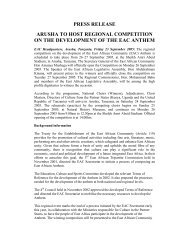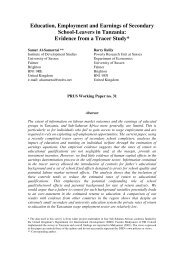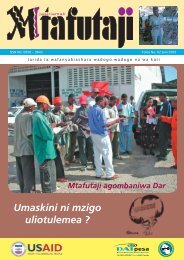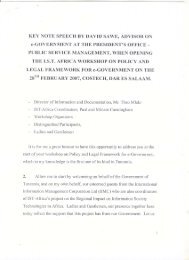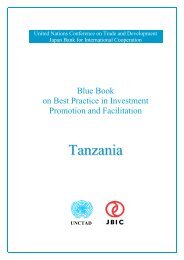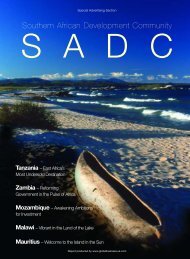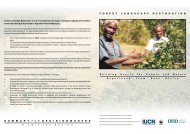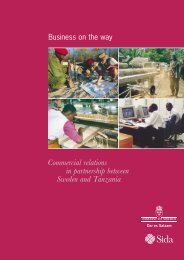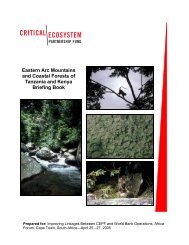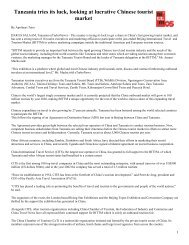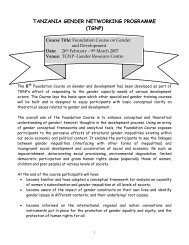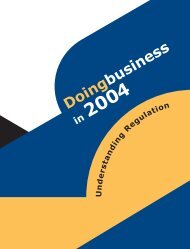September 2005 - Tanzania Development Gateway
September 2005 - Tanzania Development Gateway
September 2005 - Tanzania Development Gateway
Create successful ePaper yourself
Turn your PDF publications into a flip-book with our unique Google optimized e-Paper software.
ASPO Ireland<br />
www.peakoil.ie/newsletters<br />
Iraqis Accuse Kuwait of Stealing Oil<br />
By THE ASSOCIATED PRESS<br />
Published: August 2, <strong>2005</strong><br />
BAGHDAD, Iraq (AP) — Iraqi legislators accused Kuwait of stealing their oil as well as chipping<br />
away at their national territory on the border — allegations similar to those used by Saddam Hussein to<br />
justify his invasion of Kuwait that began 15 years ago Tuesday.<br />
An Iraqi delegation was scheduled to head to Kuwait on Wednesday discuss the incidents along the<br />
Kuwaiti border. ''There have been violations such as digging horizontal oil wells to pump Iraq oil,''<br />
legislator Jawad al-Maliki, chairman of the parliament's Security and Defense Committee, told the<br />
National Assembly on Tuesday. In such horizontal wells, instead of drilling straight down, Kuwaitis<br />
would drill at an angle either going into subterranean Iraqi territory or sucking oil out of pools from Iraqi<br />
territory. He also said Kuwaitis have taken territories up to half a mile inside Iraq.<br />
''We believe that we have overcome the past and that we opened a new page of positive relations.<br />
These relations have to be respected by Kuwait,'' said al-Maliki, a member of Prime Minister Ibrahim al-<br />
Jaafari's Dawa Party.<br />
Relations between Iraq and Kuwait resumed after the 2003 U.S.-led invasion of Iraq that toppled<br />
Saddam and border points were reopened. On Saturday, a Kuwaiti official said a number of Iraqi homes<br />
and farms have slightly ''encroached'' into Kuwait at the border area of Umm Qasr in southern Iraq. The<br />
officials said they want to resolve the border issue in negotiations.<br />
Some farms that belonged to Iraqis were razed when the United Nations redrew the border in 1993,<br />
two years after a U.S.-led international coalition fought the Gulf War that ended a seven-month Iraqi<br />
occupation of this country that began with Saddam's Aug. 2, 1990 invasion. The Iraqi owners were<br />
compensated.<br />
Legislator Hassan al-Sunneid said a four-member delegation of three legislators and deputy foreign<br />
minister Mohammed Haji Hmoud will head to Kuwait to try to find a solution. ''There has been a border<br />
problem with Kuwait since the Iraqi state was established,'' legislator Mansour al-Basri said. ''We hope<br />
that these border problems will be solved according to historical and geographical basis.''<br />
He accused Kuwaitis of even taking the deep water side of the Umm Qasr port where giant ships<br />
dock. Hundreds of Iraqis demonstrated at the frontier last week to stop Kuwait from building a metal<br />
barrier between the two countries. Shots were fired across the border into Kuwait, but no one was injured<br />
and Kuwaiti border guards did not return fire. Kuwait insists the pipeline barrier, meant to stop vehicles<br />
from illegally crossing through the desert, is on its side of the frontier. The U.N. demarcation also gave<br />
Kuwait 11 oil wells and an old naval base that used to be in Iraq.<br />
When Saddam was still in power, Kuwait built a defensive trench along the 130-mile border to stop<br />
border infiltration from both sides. U.N. peacekeepers patrolled the frontier until just before the invasion<br />
of Iraq.<br />
596. Revising the Database<br />
Some readers have sought explanations for the periodic revisions to the table at the beginning of the<br />
Newsletter. It is a summary of a depletion model and database that have been maintained for about 15 years,<br />
being subject to continual revision and refinement. It will be readily understood that public reserve and<br />
production data are grossly unreliable, and that even the industry databases show widely different estimates.<br />
Accordingly, it is necessary to look for trends and relationships, as well as apply common sense and<br />
geological knowledge, to try to come up with realistic assessments. The next revision may well see a<br />
reduction in the Yet-to-Find, based on extrapolating the falling trend. Furthermore, modelling depletion<br />
involves not only the calculation of natural depletion rates as imposed by the immutable physics of the<br />
reservoirs, but also relies on assessing politico-economic factors, especially in relation to critical Middle East<br />
supply. Each country is evaluated individually and then summed to give regional and world totals. It is well<br />
said that all numbers are wrong: the challenge being to determine by how much.<br />
Much interest devolves on the date of peak, but this really misses the point. It is not an isolated or high<br />
peak, merely the indicated maximum on a fairly gentle production curve. Small changes in the estimates and<br />
modelling can shift it by a few years one way or the other. The Middle East Gulf is a particularly sensitive<br />
case. Production reached an historic peak in 1974 of 21.2 Mb/d. As currently modelled, production will rise<br />
from 19.4 Mb/d in 2004 to 20.5 Mb/d this year before declining gently to 19 Mb/d by 2030. It might indeed<br />
make sense to slightly modify the model and reserve estimates in, for example, Iraq, where there is a wide<br />
range of possible scenarios, so as to shift overall regional peak from 1974 to some date over the next few<br />
years. However, the importance is not so much in the date of peak itself but in recognition of the long,<br />
remorseless decline that follows.<br />
ASPO Newsletter 57, <strong>September</strong> <strong>2005</strong> page 6 of 12



